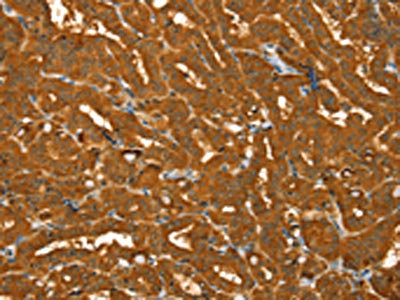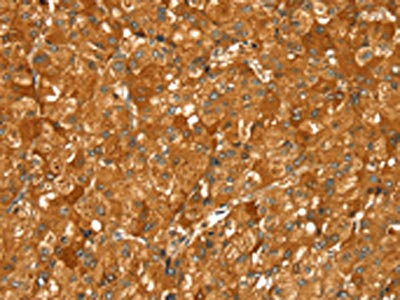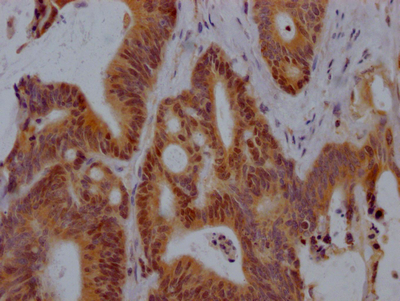PYGM Antibody
-
货号:CSB-PA176883
-
规格:¥1100
-
图片:
-
The image on the left is immunohistochemistry of paraffin-embedded Human thyroid cancer tissue using CSB-PA176883(PYGM Antibody) at dilution 1/30, on the right is treated with fusion protein. (Original magnification: ×200)
-
The image on the left is immunohistochemistry of paraffin-embedded Human liver cancer tissue using CSB-PA176883(PYGM Antibody) at dilution 1/30, on the right is treated with fusion protein. (Original magnification: ×200)
-
Gel: 8%SDS-PAGE, Lysate: 40 μg, Lane: Mouse heart tissue, Primary antibody: CSB-PA176883(PYGM Antibody) at dilution 1/400, Secondary antibody: Goat anti rabbit IgG at 1/8000 dilution, Exposure time: 40 seconds
-
-
其他:
产品详情
-
Uniprot No.:P11217
-
基因名:
-
别名:Glycogen phosphorylase antibody; Glycogen phosphorylase muscle form antibody; muscle form antibody; Muscpho antibody; Myophosphorylase antibody; Phosphorylase glycogen muscle (McArdle syndrome glycogen storage disease type V) antibody; Pygm antibody; PYGM_HUMAN antibody
-
宿主:Rabbit
-
反应种属:Human,Mouse,Rat
-
免疫原:Fusion protein of Human PYGM
-
免疫原种属:Homo sapiens (Human)
-
标记方式:Non-conjugated
-
抗体亚型:IgG
-
纯化方式:Antigen affinity purification
-
浓度:It differs from different batches. Please contact us to confirm it.
-
保存缓冲液:-20°C, pH7.4 PBS, 0.05% NaN3, 40% Glycerol
-
产品提供形式:Liquid
-
应用范围:ELISA,WB,IHC
-
推荐稀释比:
Application Recommended Dilution ELISA 1:2000-1:5000 WB 1:500-1:2000 IHC 1:30-1:150 -
Protocols:
-
储存条件:Upon receipt, store at -20°C or -80°C. Avoid repeated freeze.
-
货期:Basically, we can dispatch the products out in 1-3 working days after receiving your orders. Delivery time maybe differs from different purchasing way or location, please kindly consult your local distributors for specific delivery time.
相关产品
靶点详情
-
功能:Allosteric enzyme that catalyzes the rate-limiting step in glycogen catabolism, the phosphorolytic cleavage of glycogen to produce glucose-1-phosphate, and plays a central role in maintaining cellular and organismal glucose homeostasis.
-
基因功能参考文献:
- Results show that PYGM and RAC1 are altered in the dorsolateral prefrontal cortex in chronic schizophrenia and are controlled by NMDA signaling in the rodent cortex and cortical astrocytes suggesting an altered NMDA-dependent glycogenolysis in astrocytes in schizophrenia. PMID: 27156240
- This report expands the phenotype and genotype of McArdle disease and suggests that PYGM mutations should be looked for in patients with very late-onset myopathy with no previous history of exercise intolerance PMID: 28120463
- Because the NMD mechanism does not seem to operate in nonspecific cells, PBMCs were more suitable than muscle biopsies for detecting the pathogenicity of some PYGM mutations, notably the silent mutation whose effect in the splicing of intron 6 was unnoticed in previous muscle transcriptomic studies PMID: 26913921
- Variations in AMPD1, CPT2, and PGYM genes are not associated with the onset, susceptibility, or severity of chronic fatigue syndrome. PMID: 27525900
- update of the reported mutations and polymorphisms in the PYGM gene [review] PMID: 25914343
- study found that T lymphocytes expressed myophosphorylase in healthy donors, but expression was significantly lower in McArdle patients (p<0.001); PYGM mRNA levels were also lower in white blood cells from McArdle patients PMID: 25240406
- biological significance of this PKCtheta;/alphaPIX/Rac 1 GTPase/PYGM signaling pathway seems to be the control of different cellular responses such as migration and proliferation PMID: 25694429
- 5 different PYGM mutations were found in 8 Brazilian families: 4 previously described (p.R50X, p.T692kfs30, p.K609K, and p.G455R), and one, pI513V, a novel heterozygous mutation. PMID: 23653251
- a novel mutation, in the PYGM gene c.632delG, in three unrelated families of Jewish descent originating from the Caucasus region PMID: 22608882
- a new role for Rac1 in cell signaling, showing that this GTPase triggers T-cell proliferation upon IL-2 stimulation by associating with PYGM and modulating its enzymatic activity. PMID: 22337875
- No genotype-phenotype correlation is evident and that no gender effect is related to the phenotype of McArdle's disease (PYGM gene) in a cohort of 123 European McArdle's disease patients. PMID: 21802952
- The current data add to the list of pathogenic mutations in the PYGM gene associated with McArdle disease PMID: 21880526
- This study demonistrated that PYGM mutation in McArdle disease. PMID: 21658951
- indicate that in both patients' and controls' cell cultures, unlike in skeletal muscle tissue, most of the protein and GP activities result from the expression of brain GP and liver GP genes PMID: 20957198
- McArdle disease may be caused by a R269X nonsense mutation in this gene. PMID: 11749054
- two new mutations in the myophosphorylase gene in Italian patients with McArdle's disease; both were compound heterozygous, with the common mutation at codon 49 (R49X) on the other allele PMID: 12031624
- molecular genetic study of McArdle's disease in Yemenite-Jewish patients expands the already remarkable genetic heterogeneity of McArdle's disease and suggests the existence of ethnic or private mutations within this group. PMID: 12398832
- In Mcardle's disease (deficiency of this enzyme) efferent muscle sympathetic nerve activity (MSNA) is attenuated. PMID: 12640006
- the muscle subtype of glycogen phosphorylase mRNA level is up-regulated in preeclampsia in placenta PMID: 14662163
- A new autosomal dominant gene mutation in McArdle disease. PMID: 15979037
- We report a Spanish family with muscle glycogen phosphorylase (PYGM) deficiency (McArdle's disease) harbouring a novel compound genotype (A659D/L586P). PMID: 16154688
- muscle isoform of human glycogen phosphorylase has structural differences that are consistent with the long-known kinetic differences between the liver and muscle enzymes PMID: 16523484
- 19 novel mutations within the PYGM gene are associated with McArdle disease. PMID: 16786513
- findings further demonstrate molecular heterogeneity of myophosphorylase deficiency, absence of genotype-phenotype correlation and expand the already crowded map of mutations within the myophosphorylase gene PMID: 17324573
- The study further extends the genetic heterogeneity of myophosphorylase gene mutations showing no mutational hotspot and no genotype-phenotype correlation. PMID: 17404776
- This unique case of a false negative myophosphorylase histochemical reaction is apparently related to sepsis. PMID: 17719780
- Glycogenosis type V is an autosomal recessive metabolic disorder caused by a deficiency of the muscle isoform of glycogen phosphorylase (myophosphorylase, PYGM. [REVIEW] PMID: 17915571
- To investigate if nonsense mediated decay affects the levels of transcripts containing PYGM mutations, 28 Spanish patients with McArdle disease, harboring 17 different mutations with premature termination codons in 77% of their alleles, were studied. PMID: 17994553
- Defect in glycogen breakdown is due to mutations of the gene for myophosphorylase in McArdle disease (gycogenosis type V). PMID: 18808785
- Different PYGM mutations and mutant molecular mechanisms are described in patients with McArdle disease. PMID: 19251976
- study of two patients with atypical McArdle disease who carried common mutations on one allele (R50X and G205S), and novel splice mutations in introns 3 [IVS3-26A>G (c.425-26A>G)] and 5 [IVS5-601G>A (c.856-601G>A)] on the other allele PMID: 19433441
- Nine novel mutations of PYGM were identified in patients with McArdle disease. PMID: 19472443
显示更多
收起更多
-
相关疾病:Glycogen storage disease 5 (GSD5)
-
蛋白家族:Glycogen phosphorylase family
-
数据库链接:
HGNC: 9726
OMIM: 232600
KEGG: hsa:5837
STRING: 9606.ENSP00000164139
UniGene: Hs.154084
Most popular with customers
-
YWHAB Recombinant Monoclonal Antibody
Applications: ELISA, WB, IF, FC
Species Reactivity: Human, Mouse, Rat
-
Phospho-YAP1 (S127) Recombinant Monoclonal Antibody
Applications: ELISA, WB, IHC
Species Reactivity: Human
-
-
-
-
-
-























